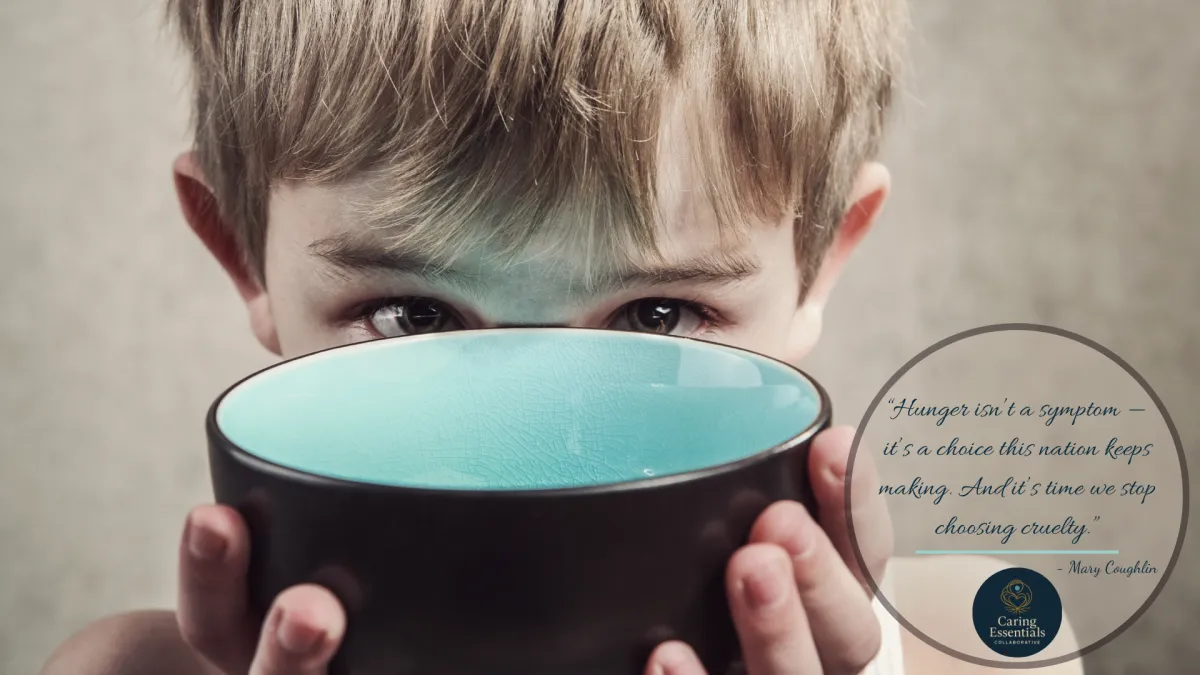
I Remember Being Hungry: A Call to End Food Injustice
“Hunger isn’t a symptom — it’s a choice this nation keeps making. And it’s time we stop choosing cruelty.” - Mary Coughlin
I remember being hungry.
I was in nursing school, newly married, newly pregnant, and newly disowned. My family wanted nothing to do with me once I got pregnant. My husband was struggling with addiction and couldn’t hold a job. I was trying to stay in school, which already felt like a privilege, but I knew if I wanted to make it — if I wanted to keep going — I needed public assistance.
So I applied. And I got it.
I still remember what that felt like — the mixture of shame and relief, the ache of wanting to do everything “right” but being told by the world that asking for help was a moral failure. There were nights when I would open the refrigerator and just stare, calculating what could stretch another day. Fear like that — fear for your child’s hunger — it settles into your bones.
And here we are again, decades later, in a country that is supposed to know better. Watching the same cruelty play out, only now it’s wrapped in political spin and bureaucratic language. Watching people in power — people who will never know hunger — strip away the small bit of support that keeps families from falling apart.
This isn’t about “budget cuts.” It’s about control. It’s about contempt. It’s about deciding who deserves to eat and who doesn’t — and that is cruelty, plain and simple.
I know what it feels like to be told your life is a burden. But I also know what it means to survive. To get up anyway. To feed your child anyway. To keep showing up for a system that would rather you disappear.
The truth is, this story started long before me. When I was a little girl — the oldest of seven — my dad got cancer and couldn’t work for a long time. My mom tried to hold everything together, but she had seven mouths to feed and no paycheck coming in. We went on public assistance then too. I can still feel the tension in the house — the whispered conversations, the embarrassment at the grocery store, the way my mother tried to act like everything was fine when it wasn’t.
Public assistance saved us. And yet the world treated us like we were stealing.
That’s the part people don’t want to face: hunger isn’t an accident. It’s a consequence of policy, of greed, of the racism and classism built into this country’s bones. We shame the poor to keep the privileged comfortable. We punish struggle because it reminds the powerful of their own fragility.
And now, as I watch the same kind of cruelty take hold again — as food assistance programs are slashed, as politicians brag about fiscal discipline while families line up at food pantries — my heart breaks all over again. But it doesn’t just break. It burns.
Because I know what hunger does to a person’s dignity. I know how quickly shame replaces hope. And I know how easy it is for the rest of the world to look away.
But here’s the thing: some people aren’t looking away. My daughters both work at childcare centers, and they’re running food drives — quietly, faithfully, feeding families who need it most. And they shouldn’t have to. It shouldn’t depend on the kindness of overworked teachers to fill the gap left by a callous government. But still, they do it. Because they remember too. Because they care.
We need more of that — and more than that.
We need to help folks find food, yes — but we also need to call out the cruelty that makes food drives necessary. We need to stop pretending this is just about economics. This is about humanity. About who we are and what kind of nation we want to be.
I remember being hungry.
I remember watching my mother hide her worry.
I remember the sound of my own stomach growling while I studied to become a nurse — a nurse who would go on to care for babies born into the same systems of neglect and inequality.
And I remember deciding that I would never forget.
Because memory is power. And silence is complicity.
So here’s my call to action — to anyone reading this:
Feed someone. Donate to your local food pantry. Run a drive at your workplace. Support the organizations fighting to protect SNAP and WIC. And most of all, speak up. When you hear someone sneer about “handouts,” remind them that no child should ever go hungry in a country of this abundance.
We can’t fix what we won’t name. And right now, what we are facing is not a policy dispute. It’s a moral crisis.
I remember being hungry — and I will not let this nation forget what that feels like.
Suggested Actions: Visit these organizations’ websites to donate, volunteer, sign up for alerts, or share their advocacy campaigns.
Feeding America – A nationwide network of 200+ food banks fighting hunger in the U.S.
No Kid Hungry – Focused on ending child hunger in America, with advocacy and program work.
Bread for the World – A U.S. advocacy organization working to change the policies and systems that allow hunger and poverty to persist.
U.S. Hunger – Provides meals and addresses root causes of food insecurity for families in the U.S.
In solidarity and resistance, until the cupboards are full and justice is served.
Mary
